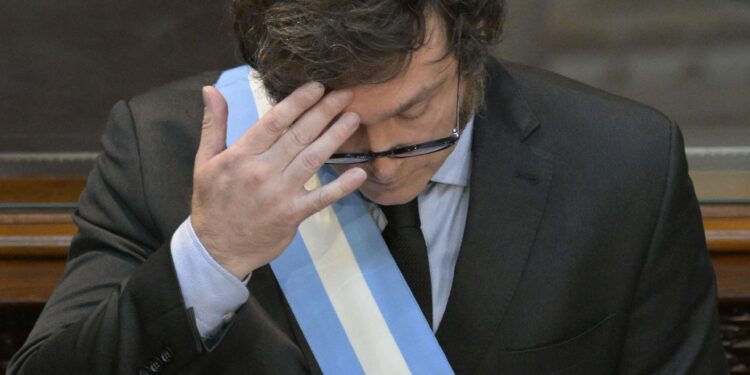In his first policy speech, Argentine President Javier Mele confirmed that he will advance a broad economic reform package regardless of whether Parliament approves it or not.
He told Parliament yesterday, Friday, that his reform project, which includes budget cuts and measures to liberalize the economy, “will change this country… with or without the support of political leaders, and with all the legal resources of the executive authority.” “If you want conflict, you will get conflict,” he added.
He reviewed the outcome of his first 82 days in office, during which he reduced the value of the peso (the national currency) by more than 50%, reduced government subsidies for fuel and transportation, cut tens of thousands of public service jobs, and canceled hundreds of measures in an effort to liberalize the economy.
Milley continued, “I ask for patience and confidence. It will be some time before we can see the fruits of the economic reorganization and the reforms that we are implementing.”
Many of his planned reforms face legal challenges, as trade unions, chambers of commerce and non-governmental organizations have filed more than 60 lawsuits, at a time when Argentina has witnessed massive protests by citizens who fear that Milli’s plan will make them poorer.
Milley said, “We have not yet seen all the consequences of the disaster we inherited, but we are convinced that we are on the right path, because for the first time in history we are confronting the problem from its cause, the financial deficit, and not its symptoms.”
In recent weeks, Milley has reached out to provincial governors, party leaders and former presidents to form a “new social contract” for the country based on 10 principles including a “non-negotiable” budget, “untouchable” private property and cutting public spending to an “unprecedented” level at 25% of GDP.
bad management
Facing opposition from lawmakers, Milley canceled about half of the 664 reforms from a broad economic liberalization bill he announced after assuming the presidency, before withdrawing it from its foundations.
But the president pledged to return the draft law to Parliament. He threatened to pass the reforms by presidential decree if lawmakers did not agree.
Argentina is suffering from severe economic difficulties after decades of mismanagement that pushed poverty levels to approximately 60% and annual inflation rates to more than 200%.
Milley, 53 years old and new to politics, achieved a resounding victory in the elections last year amid a wave of anger over an economic crisis that witnessed the printing of banknotes and a financial deficit.
The government says that some of the changes introduced by Milley are beginning to bear fruit. Last January, Argentina announced its first monthly budget surplus in 12 years, boosting foreign currency reserves from $21 billion to $27 billion.
But with annual inflation continuing, the poor were hit hard when Milley’s government scrapped transport and energy subsidies and froze aid to 38,000 restaurants offering free meals pending a financial review.
Milley stresses that these measures must be taken to save the economy and alerts citizens to the need to prepare for things to get worse before they get better.



